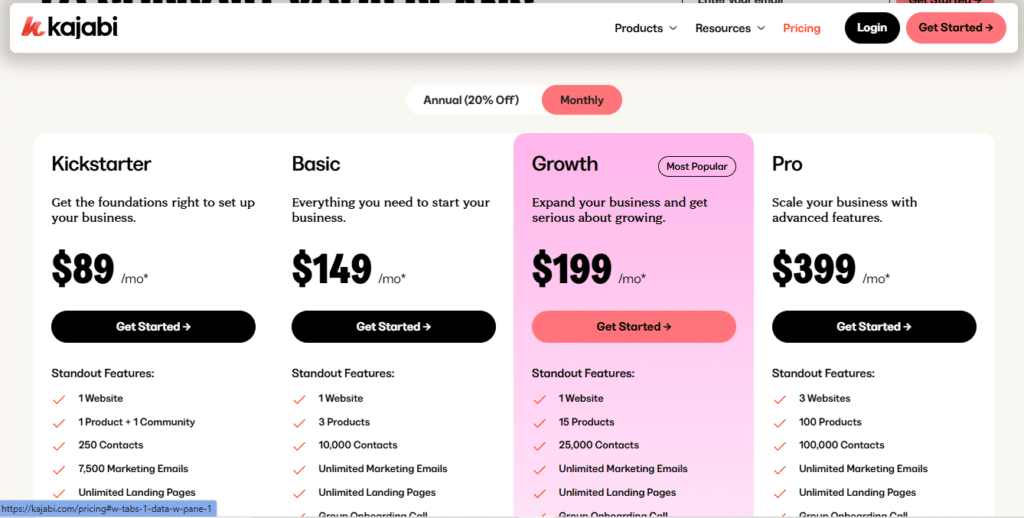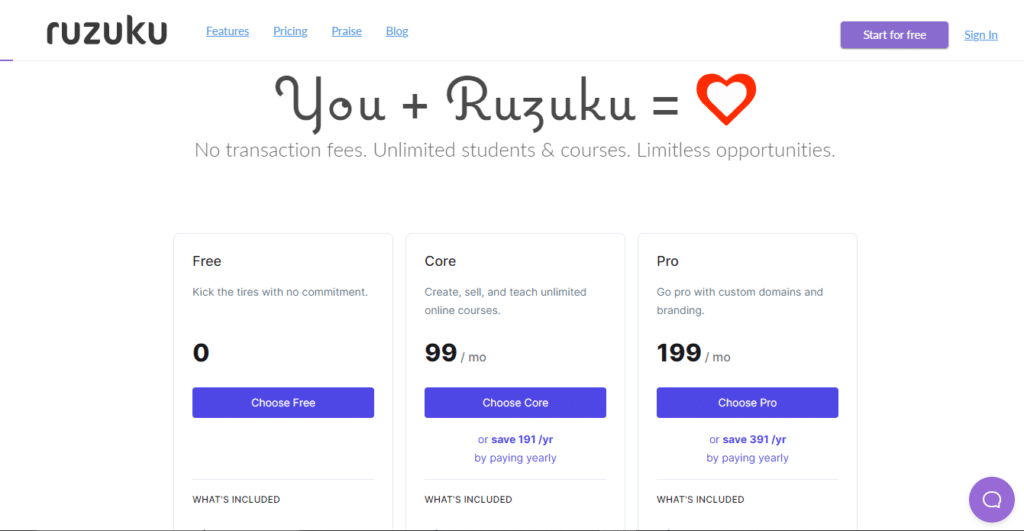Kajabi vs Ruzuku: A Comprehensive Platform Comparison
When it comes to creating and selling online courses, choosing the right platform is crucial for the success of your knowledge business. Kajabi and Ruzuku are two distinct platforms that cater to course creators and online educators, but they approach course creation and business building from different angles. This detailed comparison will help you determine which platform better aligns with your teaching style, business goals, and technical preferences, whether you're just starting out or looking to scale your existing online education business.
Overview of Kajabi

Kajabi is an all-in-one platform designed for entrepreneurs, creators, and educators looking to build and scale their online businesses. It provides a comprehensive ecosystem for creating, marketing, and selling digital products such as online courses, memberships, and coaching programs—all without relying on multiple third-party tools.
With its integrated website builder, email marketing automation, and sales pipeline creation, Kajabi simplifies the process of running a digital business. Even users with minimal technical knowledge can easily create high-quality content using pre-built templates and intuitive drag-and-drop functionality. By integrating powerful marketing tools with a robust learning management system (LMS), Kajabi enables businesses to efficiently attract, engage, and convert their audience while maximizing revenue—all from a single, user-friendly dashboard.
Key Features of Kajabi
- Course Creation Tools: Develop and deliver engaging online courses with video content, assessments, and drip-fed lessons.
- Website Builder: Design fully responsive, professional websites with built-in blogging capabilities and customizable templates.
- Sales Pipelines: Create automated funnels for lead generation, product launches, and webinars.
- Email Marketing Automation: Send personalized email campaigns, track engagement, and automate follow-ups.
- Membership Capabilities: Set up subscription-based memberships to generate recurring revenue.
- Payment Integration: Securely accept payments via Stripe and PayPal with zero additional transaction fees.
- Analytics Dashboard: Monitor revenue, track customer behavior, and measure marketing performance with in-depth insights.
- Community Features: Build an interactive member space for discussions, engagement, and networking.
Ideal User Base for Kajabi
- Course Creators: Educators and professionals looking to monetize their knowledge through online courses.
- Coaches & Consultants: Those offering coaching services, webinars, and one-on-one mentorship programs.
- Membership Site Owners: Entrepreneurs looking to create thriving subscription-based communities.
- Digital Entrepreneurs: Individuals managing multiple digital products and looking for a streamlined business solution.
Overview of Ruzuku

Ruzuku is a specialized online course platform focused on creating engaging learning experiences with an emphasis on simplicity and student interaction. Founded in 2011 by Abe Crystal and Rick Cecil, Ruzuku was designed with a clear philosophy: make online course creation accessible to educators who prioritize student engagement and community-based learning over complex marketing features.
Unlike all-in-one business platforms, Ruzuku concentrates specifically on the course creation and delivery aspects of online education. The platform stands out for its intuitive course builder, robust discussion features, and streamlined student experience. Ruzuku's approach emphasizes pedagogical effectiveness rather than marketing complexity, making it particularly appealing to educators, subject matter experts, and organizations that value learning outcomes and student interaction.
With its focus on simplicity and engagement, Ruzuku creates a supportive environment for both course creators and students. The platform handles the technical aspects of course delivery while providing tools that facilitate meaningful learning communities—allowing educators to focus on what they do best: teaching and engaging with their students.
Key Features of Ruzuku
- Intuitive Course Builder: Create structured online courses with a user-friendly interface requiring minimal technical skills.
- Robust Discussion Tools: Facilitate meaningful student interaction with integrated commenting and discussion features.
- Teleconference Integration: Host and record live events directly within your courses using Zoom integration.
- Activity-Based Learning: Design engaging learning experiences with various activity types and multimedia content.
- Progress Tracking: Monitor student advancement with completion tracking and activity logs.
- Automated Communications: Send scheduled emails to keep students engaged throughout the course.
- Payment Processing: Accept one-time or subscription payments through Stripe or PayPal.
- Co-Instructor Support: Collaborate with teaching assistants or co-instructors on course delivery.
Ideal User Base for Ruzuku
- Educators and Teachers: Professionals focusing on effective pedagogy and student engagement.
- Subject Matter Experts: Individuals with specialized knowledge who prioritize teaching over marketing.
- Small Educational Organizations: Schools, nonprofits, and training providers with focused course offerings.
- Community-Focused Instructors: Teachers who value student interaction and discussion-based learning.
- Non-Technical Course Creators: Those who prefer simplicity over complex features and extensive customization.
Core Functionalities Comparison
Understanding the fundamental differences between Kajabi and Ruzuku is essential for determining which platform better suits your specific teaching approach and business goals. Here's a detailed comparison of their core functionalities:
1. Course Creation and Content Delivery
Kajabi offers a versatile course builder with multiple content organization options. Courses can be structured into categories, modules, and lessons with support for various media types including video, audio, quizzes, and downloadable resources. The platform allows for advanced content scheduling with drip delivery, prerequisite lessons, and completion requirements. Kajabi's assessment capabilities include quizzes with different question types, assignments, and automated grading. The platform's strength lies in its flexibility to create diverse learning experiences from simple courses to complex educational programs.
Ruzuku provides a more streamlined, activity-based course creation approach. The platform organizes courses into lessons and steps (activities) with an intuitive, linear learning path. Ruzuku supports standard content types like video, audio, text, and PDF files with a focus on simplicity and user experience. While offering fewer customization options than Kajabi, Ruzuku's course builder is exceptionally user-friendly, requiring minimal technical expertise. The platform's unique “activity” framework encourages instructors to think in terms of student engagement rather than just content delivery, promoting effective instructional design even for beginners.
2. Student Engagement and Community Features
Kajabi includes community features that allow course creators to build member spaces for discussion and engagement. Students can interact through posts, comments, and direct messaging, with options for organizing discussions by topics. Community spaces can be standalone products or integrated with courses. While functional, Kajabi's community tools are somewhat basic compared to dedicated community platforms, focusing more on simple interaction rather than deep engagement facilitation.
Ruzuku excels in facilitating student engagement with robust discussion and interaction tools built directly into the learning experience. The platform's commenting system allows contextual discussions on specific content, creating natural conversation flows around learning materials. Instructors can easily participate in discussions, answer questions, and provide feedback within the course environment. Ruzuku's strength lies in creating cohesive learning communities where discussion is seamlessly integrated with content rather than separated in a distinct area. For educators prioritizing substantive student interaction, Ruzuku's engagement tools offer a significant advantage.
3. Marketing and Sales Capabilities
Kajabi provides comprehensive marketing tools designed to attract students and sell courses effectively. The platform includes landing page builders, email marketing automation, sales funnels (Pipelines), and checkout optimization features. Kajabi's “Pipelines” feature offers pre-built marketing funnels for various scenarios like product launches, lead magnets, and webinars. The platform also supports affiliate programs, upsells, and complex pricing models. For course creators focused on marketing and sales, Kajabi offers a complete ecosystem that eliminates the need for multiple marketing tools.
Ruzuku offers more basic marketing and sales capabilities focused on essential functionality rather than advanced automation. The platform provides simple course landing pages, basic email notifications, and coupon codes, but lacks the sophisticated marketing features found in Kajabi. Ruzuku does not include built-in email marketing, sales funnels, or affiliate management systems. For comprehensive marketing, Ruzuku users typically integrate with third-party tools or services. This simplified approach aligns with Ruzuku's focus on education over marketing, making it suitable for creators who either have existing marketing systems or prefer to focus primarily on course delivery.
4. Website and Branding Capabilities
Kajabi includes a full-featured website builder with customizable themes, blog functionality, and integrated course sales. Users can create complete branded websites with product pages, marketing content, and navigation menus all within the platform. Kajabi offers extensive customization options including color schemes, typography, and layout adjustments to match specific brand identities. The platform can serve as a creator's entire web presence, eliminating the need for separate website solutions in many cases.
Ruzuku provides more limited website functionality focused primarily on course delivery rather than building a complete web presence. While users can customize colors, logos, and basic branding elements, Ruzuku does not offer a full website builder or blog functionality. The platform provides simple course landing pages and a course catalog, but most Ruzuku users maintain separate websites for their broader online presence. This approach aligns with Ruzuku's specialization in course delivery rather than comprehensive business management.
5. Live Event and Webinar Capabilities
Kajabi offers integrated live event features through Kajabi Events, allowing users to host webinars and virtual events as standalone products or components of courses. The platform supports registration, reminders, and recording capabilities but requires integration with third-party services like Zoom for the actual webinar delivery. While functional, Kajabi's webinar features are less seamlessly integrated than some dedicated webinar platforms.
Ruzuku distinguishes itself with strong teleconference integration, particularly with Zoom. The platform allows instructors to schedule and host live sessions directly within the course environment, with automatic recording and posting of sessions for students who cannot attend live. This tight integration creates a cohesive experience where live events feel like natural extensions of the course rather than separate components. For educators who incorporate live teaching alongside asynchronous content, Ruzuku's streamlined approach to webinars and live events offers a practical advantage.
6. Analytics and Reporting
Kajabi provides comprehensive analytics covering both business performance and student engagement. The platform offers insights into sales, revenue, marketing funnel performance, and email campaign effectiveness. For course-specific data, Kajabi tracks student progress, completion rates, assessment results, and engagement patterns. These detailed analytics enable data-driven decisions across both business and educational aspects of course creation.
Ruzuku focuses on simpler, education-centered analytics that track student progress and engagement. The platform provides visibility into course completion rates, activity participation, and discussion engagement. Instructors can easily see which students are active or falling behind, enabling timely intervention and support. While Ruzuku's analytics lack the marketing and sales depth of Kajabi's reports, they offer the essential insights needed to monitor student performance and course effectiveness. This approach aligns with Ruzuku's educational focus rather than business optimization.
Pricing Comparison: Kajabi vs Ruzuku
Understanding the pricing structures of both platforms is essential for making an informed decision based on your budget and business model.
Kajabi Pricing Plans

Kajabi offers several tiered pricing options designed to accommodate businesses at different growth stages:
1. Basic Plan ($149/month)
The Basic Plan is ideal for newcomers to online business. It includes essential tools to get started, such as:
- Support for 3 products and 3 pipelines.
- 10,000 contacts and 1,000 active members.
- Basic marketing automation.
- Unlimited landing pages and emails.
2. Growth Plan ($199/month)
The Growth Plan is perfect for scaling businesses that require advanced marketing features and greater resource limits:
- Support for 15 products and 15 pipelines.
- 25,000 contacts and 10,000 active members.
- Advanced automation and affiliate program management.
- Removal of Kajabi branding for a more customized experience.
3. Pro Plan ($399/month)
The Pro Plan is designed for established businesses with high-volume requirements:
- Support for 100 products and 100 pipelines.
- 100,000 contacts and 20,000 active members.
- Priority support and custom branding capabilities.
- Advanced features such as code editor access for deeper customization.
4. Kickstarter Plan ($89/month)
This budget-friendly option is ideal for beginners who want to test Kajabi's core functionalities before committing to higher-tier plans:
- Limited products and pipelines.
- Basic features for course creation and email marketing.
All Kajabi plans include a 14-day free trial, and users can save approximately 20% by opting for annual billing. Importantly, Kajabi does not charge any transaction fees on your sales, regardless of plan level.
Ruzuku Pricing Plans

Ruzuku offers straightforward pricing with three main tiers:
1. Free Plan ($0/month)
The Free Plan is designed for individual instructors just starting out:
- Unlimited courses and students
- Unlimited video, audio, and PDF hosting
- Course discussions and messaging
- Basic quizzes and surveys
- Payment processing (Stripe/PayPal) with no additional fees
- Standard email notifications
- Standard customer support
- Course landing pages
2. Core Plan ($99/month)
The Core Plan adds more engagement features for growing course businesses:
- Everything in the Bootstrapper Plan
- Zoom teleconference integration
- Unlimited webinars and live events
- Student progress tracking
- Certificates of completion
- Question & Answer features
- Priority email support
- Enhanced data exports
3. Pro Plan ($199/month)
The Pro Plan supports multiple instructors and larger educational operations:
- Everything in the Up-and-Comer Plan
- Multiple instructor accounts
- Multiple site managers
- Student self-registration
- Enhanced student data security
- API access
- Dedicated account manager
- Phone support
All Ruzuku plans include unlimited courses, students, and content hosting without additional transaction fees beyond payment processor charges. The platform offers a 30-day money-back guarantee and provides discounts for annual subscriptions (typically two months free). For organizations with specific needs, Ruzuku also offers custom enterprise solutions with tailored pricing.
Making the Right Choice for Your Business
Choosing between Kajabi and Ruzuku ultimately depends on your specific educational approach, business goals, and technical preferences. Here's guidance to help you make the decision that best aligns with your needs:
Choose Kajabi if:
- You need a comprehensive all-in-one platform to handle every aspect of your online business
- Advanced marketing features like sales funnels and email automation are essential to your strategy
- You plan to offer multiple product types beyond courses (memberships, coaching, digital downloads)
- You want to build a complete branded website as your primary web presence
- Your business model requires sophisticated tools like upsells, affiliate management, and sales pipelines
- You prioritize extensive customization options and are willing to navigate a steeper learning curve
- You're focusing on scaling a knowledge business rather than just delivering courses
- Your courses require complex assessment features, prerequisites, or diverse content organization options
Choose Ruzuku if:
- Your primary focus is on creating engaging learning experiences rather than complex marketing
- Student interaction and community engagement are central to your teaching approach
- You prefer a simpler, more intuitive platform with minimal technical complexity
- Live teaching and webinars are important components of your courses
- You value pedagogical effectiveness over marketing automation
- You already have marketing systems in place or prefer to use specialized third-party tools
- You're a subject matter expert or educator who wants to focus on teaching, not technology
- You prefer a platform that emphasizes learning outcomes and student success metrics
Both platforms offer valuable capabilities but serve somewhat different needs in the online education market. Kajabi provides a comprehensive business solution for entrepreneurs building multi-faceted knowledge businesses with diverse products and sophisticated marketing. Ruzuku offers a specialized, education-focused platform that excels in creating engaging learning experiences with strong community components.
For many educators, the decision may come down to whether they identify primarily as business entrepreneurs building a knowledge empire or as teachers focused on creating impactful learning experiences. The right choice aligns not just with your functional requirements but also with your teaching philosophy and business vision.
Consider starting with a free trial of both platforms to experience their interfaces, workflows, and approaches firsthand. This practical exposure often clarifies which environment better supports your specific teaching style and business goals.